3 Takeaways and 1 Big Mistake I Made at the Pacific Marine Expo
After seven years as a POCF, it took speaking on the National Fisherman’s panel to understand the stages of a POCF and the responsibilities that go with it.
Actually, the Q & A at the end of our talk lit me up. Hearing the experiences of women and other POCFs proved our essential influence on the industry – from Greenhorns (newbies) to our saltiest sisters, Partners of Commercial Fishermen hold power, and here’s how.
A conversation with commercial fisherman Paisley Wortman (below) revealed a new level of our impact. She explained that meeting others outside the industry has been her way of spreading awareness about wild-caught seafood. For example, as Paisley’s new friends in a bow-hunting group get to know her (because she’s that cool!), they feel more connected to commercial fishing and base purchasing decisions on that.
To them, Paisley means wild-caught seafood. Wild-caught means supporting a friend.
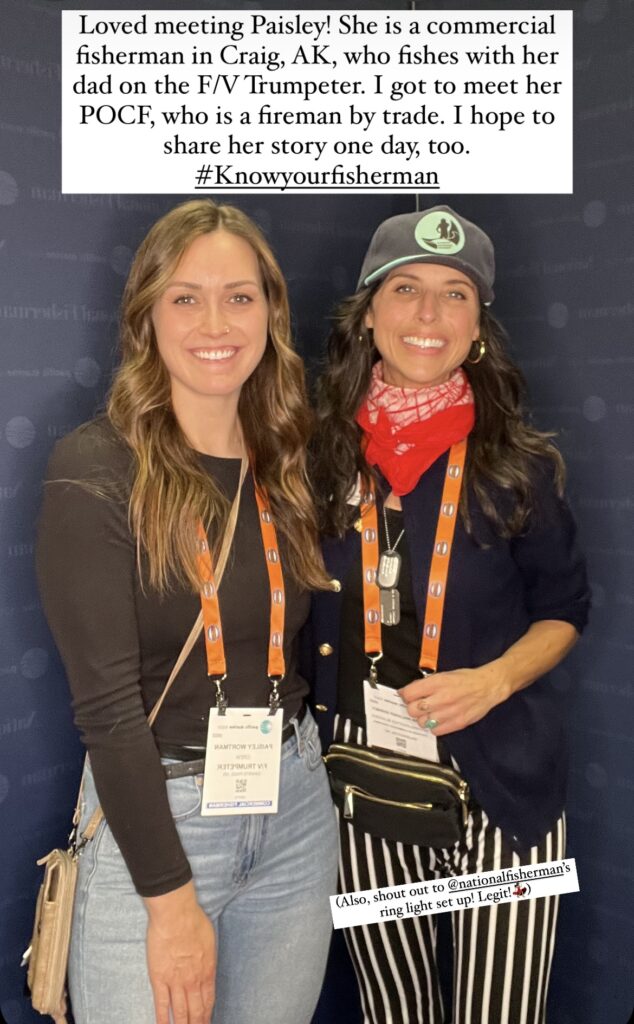
The Two Issues in Commercial Fishing:
I see two major issues in the commercial fishing community: the lack of interconnection within US fisheries and the fact that many fishermen are preaching to the choir. They may share progressive thoughts and ideas, yet the audience is…other fishermen. Although fishermen can learn from those convos, some messages seem buried in the fish hold when we need all hands on deck.
The fantastic side effect of expanding our circle is showing others that fishermen and POCFs are just like them! Sharing your life (as you are comfortable with in person or on socials) is a powerful tool for keeping seafood on people’s minds – just by being your fabulous self!
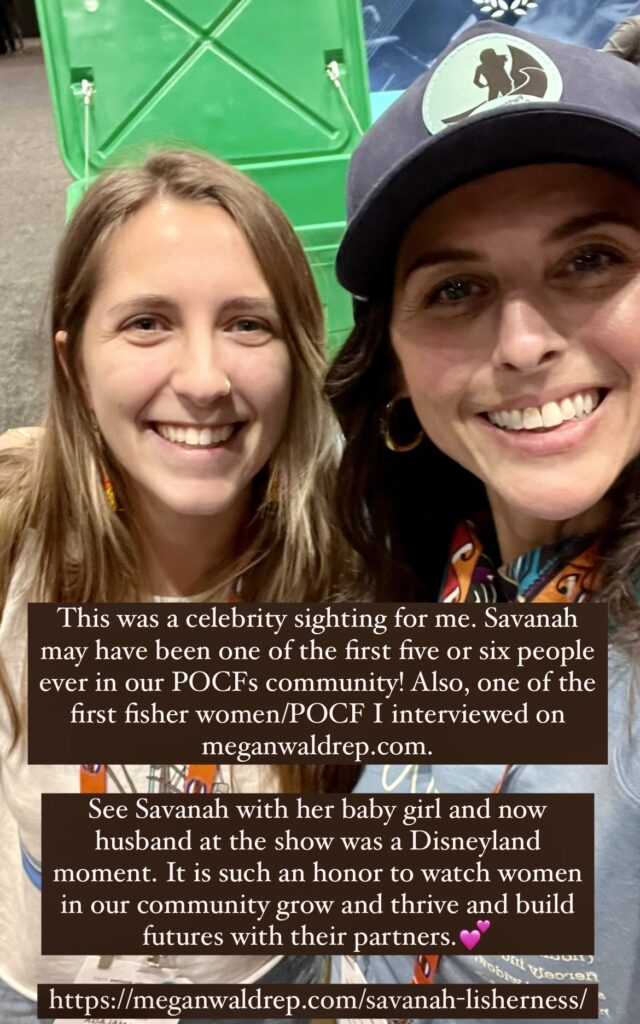
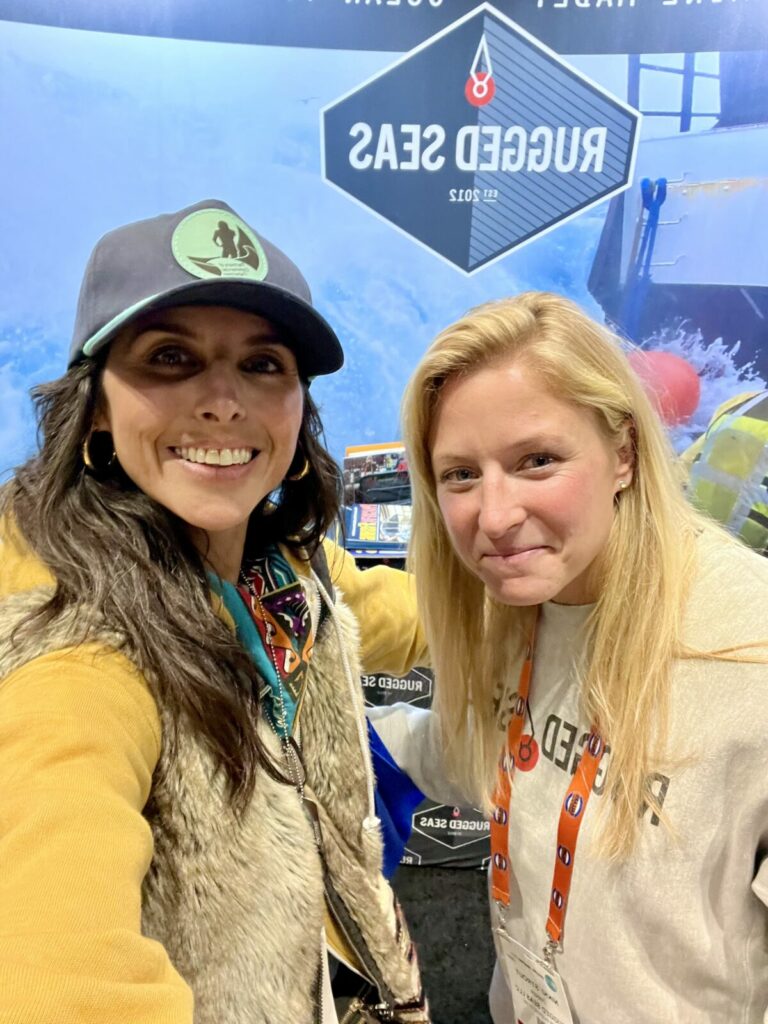
3 Takeaways from the Pacific Marine Expo in Seattle
1. POCFs doing what feels natural and right FOR US is the power.
Number one, for self-care and sanity. We have to shift our beliefs that self-care is selfish. The guilt is not real. We contribute SO MUCH MORE than we realize. (If you’re unsure, tally how much it would cost to hire the jobs you do in a day, and make it rain in your mind.)
You are priceless and are doing better than you think. It is time to put the oxygen mask on first to take care of yourself, so we can find joy when the POCF life gets challenging – because this is our one and only life, after all! – and become the greatest version of ourselves that will ripple down to our loved ones. No one will do it for us. We have to. Is that a quiet cup of tea in the morning before the kids? A new bath bomb calling our name? A morning stroll or an afternoon hike?
SHORESIDE SUPPORT IS A BIG A** JOB.
Another stage POCFs may experience is “shoreside support.” This means taking over the paperwork for the fishing business, making sure taxes, permits, and all the other stuff needed to farm the sea.
Sometimes, this job is heaped upon a POCF without warning or previous discussion. Maybe not intentionally, but it happens. Next thing you know, you’re writing to a Congressman or filling out (or creating) petitions to keep the fishery alive because fishermen are busy making a living.
Lori French, a fellow POCF and National Fisherman writer based in Morro Bay, California, explains that each new regulation or law means more paperwork for POCFs on top of the home, kids, job, and the world, and honestly, some POCFs are pissed, and I get it. You’re allowed to be pissed, and this is the place to do it without feeling judged! Your emotions do not dictate your love and support for your fisherman. We’re all on the same team here.
To dig deeper on the subject, what is the most challenging part of being “shoreside support” for you? If you could snap your finger, what would make it easier? If you’re open, please share in the comments so I can best support you (or find someone who can!)
2. Plant-based food marketing is shadowing the importance of a seafood nutrient diet.
Fellow POCF Bri Dwyer mentioned the plant-based movement over the last several years through social media campaigns and Hollywood agendas. Although veggies are vital (I could be considered a “plant-based” eater when I’m not eating seafood), the message leans toward “anti-animal protein,” which is a damn shame, considering the beneficial nutrients of seafood for a quick and easy meal. Also, our livelihoods. That sort of thing.
What’s the call to action?
Inform the younger generation. As mentioned above, we can teach children that seafood is a *premier* protein through everyday conversations. Maybe that leads to a “show-and-tell” at school or a career day (if you or your partner are available. POCFs count!). Or, pitch the idea of highlighting a seafood week or day with the school. If you’re open, use socials to deepen the word on the families behind each catch.
Educator and Fisheries Historian Trish Whetstone of @TrishTalksFish is an excellent resource. (She’s the bada$$ redhead in the feature photo!) You’ll get to know her in a future post, but until then, see her firey red passion for making seafood exciting and doable (as seen in her Insta Reel on filleting a fish)!
The lovely Katie Pitzman, Tender Operations for Trident Seafoods, is in the middle of the feature image. I got to meet Katie’s mom later in the day; she is a POCF, too! Generations, y’all!
3. Conservation, preservation, and climate via The Bering Sea Crabbers
Did you know the Bering Sea Crab fishery was shut down this year for the first time in history? Like, no one can fish. The crab numbers aren’t high enough to support a season. It seems the same reason Bristol Bay had a record season for sockeye is why crabbers are without a job – warmer water.
“The crabbers here did not ask to be the poster children for climate change, but that is the role that has befallen them,” said Sarah Schumann, coordinator of the Fishery Friendly Climate Action advocacy campaign.
Hard to argue with that.
However, there was a minimal presence of the “Old Guard” in the crowd. (That’s a Southern expression similar to the “Good Ol’ Boys Club.”) I could tell by a quiet resistance, subtle stiff upper lip as if grasping at old thought patterns as a world they’ve known quickly transforms. My heart goes out to everyone. It’s just…f*cking awful. But tradition is not the enemy of progress until it is.
But how can we help?
Jamie Goen, Executive Director of the Alaska Bering Sea Crabbers, says what needs to be said: Accountability. What can fishermen do to reduce waste and impact? (Calling our girl, Nicole, at Net Your Problem is one way to start.) Jamie is incredibly busy, as you can imagine, so I’m thrilled to connect with her after the holidays for an interview. If you don’t have time to click the link on her name to read her impressive resume, the Cliffsnotes version is that she has the compassionate POCF energy and gets sh*t done.
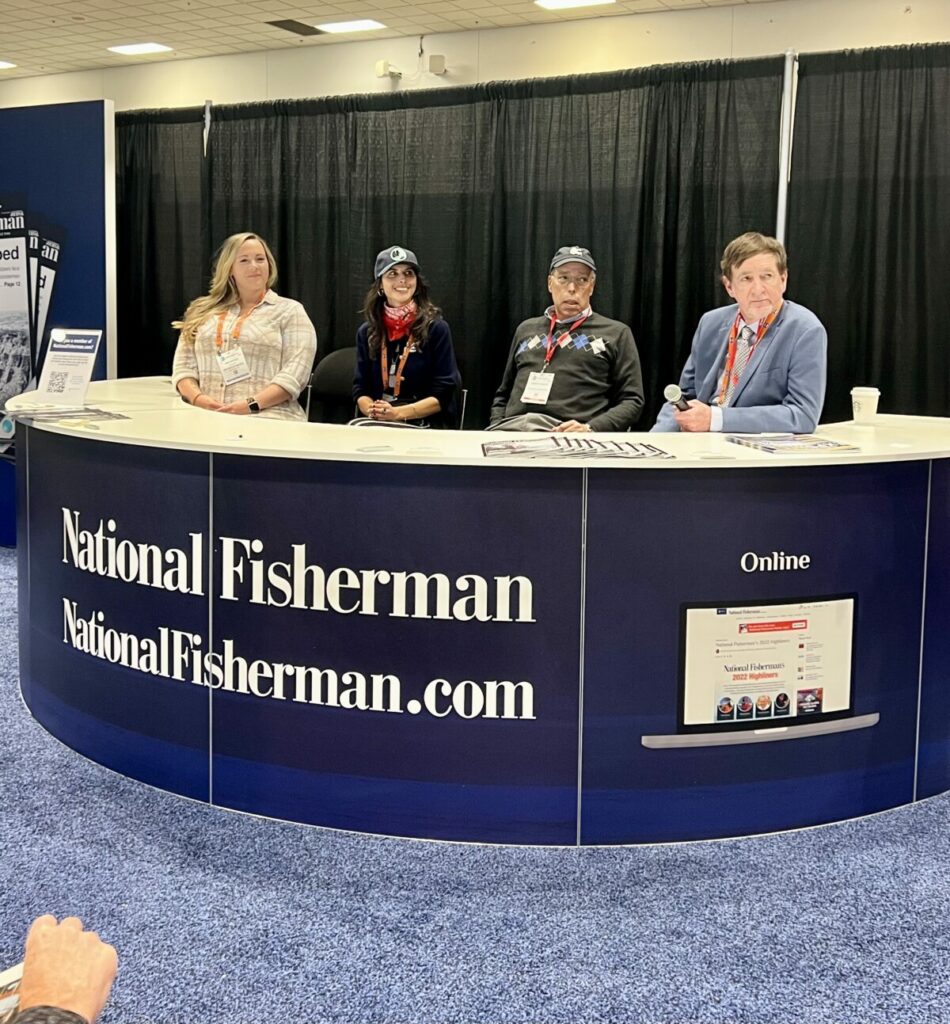
My Biggest Mistake Speaking on the National Fisherman’s Panel
My biggest mistake was not meeting people earlier. Granted, it was my first time speaking on a panel, and I was nervous, so overall, it went pretty well. I fumbled a few times, and that’s ok. But I think if I’d spoken to a few “of us” in person beforehand, I would’ve had more confidence.
I was fired up after the meet-and-greet, and I’m still carrying it with me today – surrounded by piles of PME contacts, notes from the last two years of blog comments, private groups, and socials. I am so friggin honored to hold space for us that I only want it to get better.
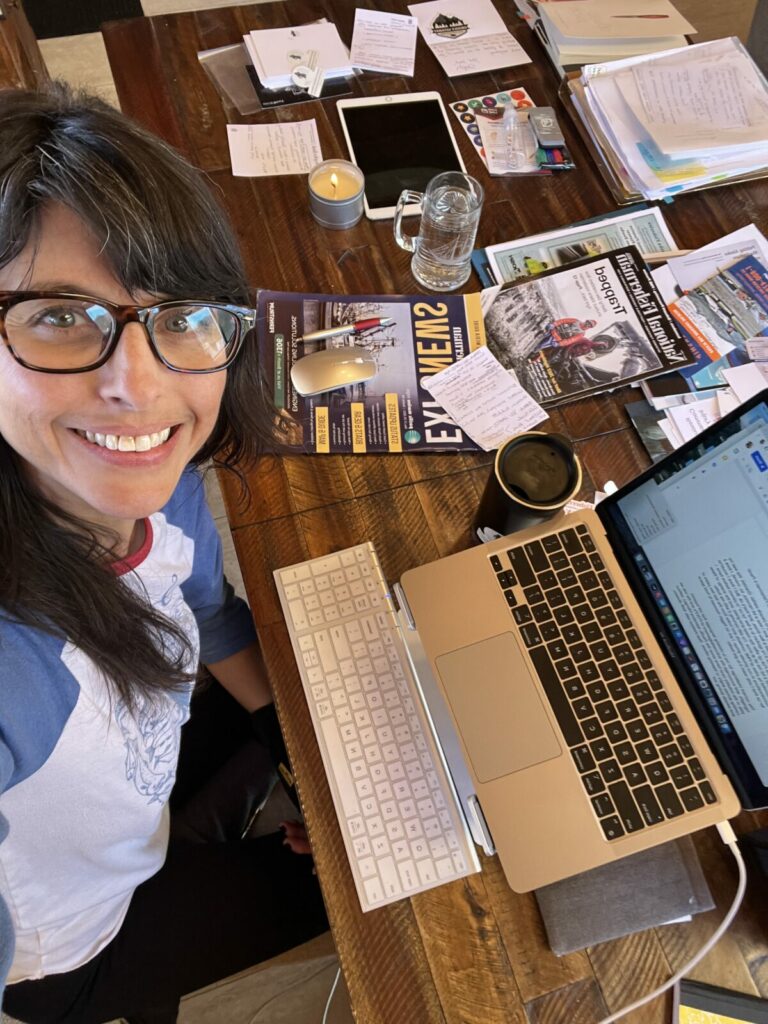
Biggest Challenge After the Pacific Marine Expo
The challenge now is choosing language that supports the acknowledgment of POCFs in the industry without sounding angry or blame-y. We’ve seen that play out in our country the last few years, and it does not land. The intention needs to change. Not only do you “catch more flies with honey than vinegar,” as the saying goes, but inclusion is the key, not division. Figuring ways to talk “to” each other and not “at?”
There’s also a great honor and responsibility to both carry the torch of former POCFs and elbow our way further into the conversation. Lean the f*ck in, if you will. I am ready and stoked to show up. What fuels my fire is learning more about you – What you’re emotions, joys, and challenges? What are your thoughts on the topics above? Do any resonate with you or bring something up?
If you feel moved, please share in the comments without judgment! There are ways to feel grounded, even when the industry around us is not. Commercial fishing isn’t the enemy, but our anxiety. Getting down to the root of our fears means we can discover ways to reverse-engineer them. I felt safe to keep posting on this site because of comments from POCFs like you when I started, and I am *so deeply grateful* for everyone who has reached out or is reading right now. It’s how our community was built and will continue to thrive, and I am so so thankful for it and you! To our unique lives as POCFs and beyond – thank you for being here!
If you liked this, you’d love Diary of a POCF: Are We Too Independent?

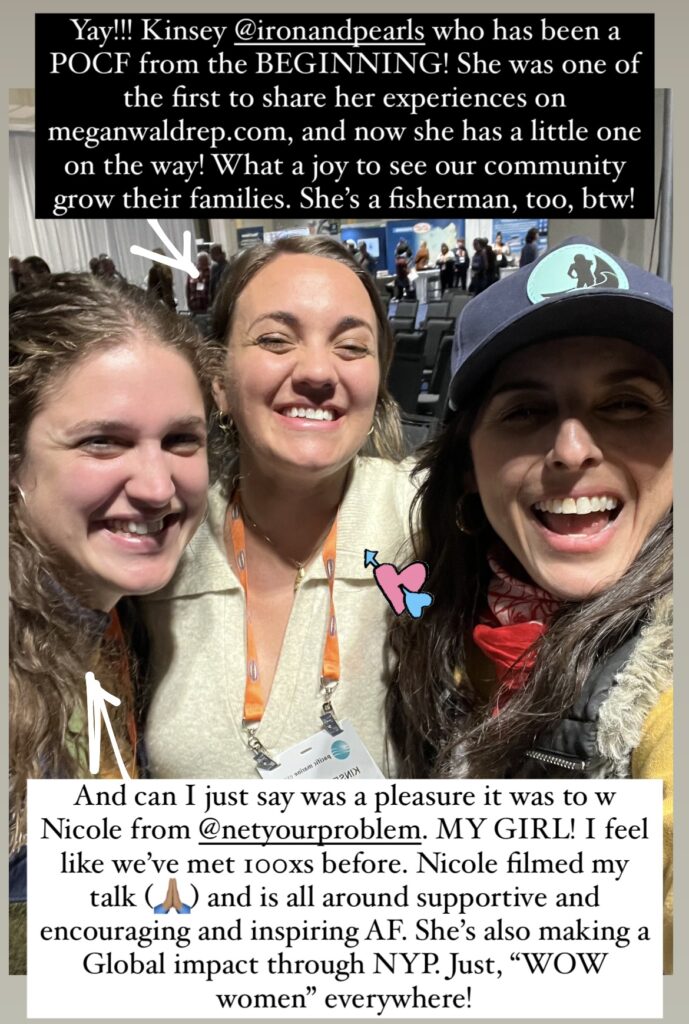
Pingback: Gift for You! Commercial Fishing CPA Accepts Clients for New Year : Megan Waldrep
Pingback: Diary: Why Self-Care is the Port in the Storm : Megan Waldrep